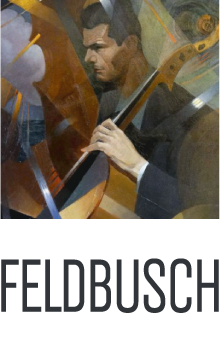Ce chant pour soprano et orchestre a été écrit à Bruxelles en 1964-1965. La création a eu lieu en 1967, à Bruxelles, avec R. SERVERIUS comme soliste et l’Orchestre de chambre de la RTB sous la direction d’Edgard Doneux (fidèle ami de toujours d’Eric Feldbusch). Il s’agit d’un poème qui évoque les années de guerre et la persécution des juifs. Il a été écrit par Ernst T Goldschmidt. Ce dernier était un ami du compositeur, qui lui a fait lire le poème à l’improviste. Le texte a tellement « parlé » au compositeur qu’il l’a mis en musique. Le poème lui-même est dédié à la mère du poète, qui a disparu à Auschwitz. Ernest T. Goldschmidt a malheureusement disparu avant que la composition ne soit terminée
À l’audition on remarque immédiatement quelques convergences avec une autre œuvre, à savoir Shêma Israël. Ce poème est également inspiré par les souffrances et les horreurs de la guerre, sans que l’accent y soit mis sur la souffrance du peuple juif durant la deuxième conflagration mondiale. Les deux œuvres se caractérisent par leur caractère perçant et douloureux, et sont composées sur une base atonale. Mein Land, d’une durée d’environ 12 minutes, est une révolte et une expression de la souffrance devant une puissance déchaîné.
Dès le début on ressent de la tension. Les échanges entre les strophes chantées et les parties instrumentales, et les échanges au sein des strophes elles-mêmes, varient tout au long de l’œuvre.
La partie chantée passe aussi par moments d’un dramatisme très expressif à un caractère plus « gracieux » lorsque des souvenirs de jeunesse sont évoqués. En dehors de cet aspect, les moments marquants de cette partie sont les courtes périodes de récitatifs et les solos du soprano exprimant un sentiment de grande tristesse.
Un autre moment impressionnant est celui où le dialogue alterné entre l’orchestre et la soprano est brutalement interrompu par un coup percutant des cymbales et du gong. L’écho du vibraphone, jouant seul, donne un effet presque apocalyptique.
Sur le plan de la structure on entend qu’après la première strophe et qu’à la fin des rappels du lied, la partie chantée n’est jamais étouffée par l’accompagnement de l’orchestre.
Le contenu du texte est souligné de manière forte et énergique sans que cela porte préjudice à l’expression de la douleur qu’il recèle.» (Extrait tiré du mémoire écrit par Alex Vervaet consacré à la carrière de Eric Feldbusch)
« Dit lied voor sopraan en orkest werd geschreven te Brussel in 1964-1965. De kreatie gebeurde in 1967, te Brussel, door R. SERVERIUS als solist en het Kamerorkest van de RTB onder leiding van Edgard Doneux (trouwe vriend van altijd van Eric Feldbusch). Het betreft een gedicht dat de oorlogsjaren en de jodenvervolging aanhaalt, dat werd geschreven door Ernst T Goldschmidt. Deze laatste was een toenmalige vriend van de toondichter die deze laatste op toevallige wijze het gedicht liet lezen en dat de komponist dermate aansprak dat het op muziek werd gezet. Het gedicht zelf werd geschreven in aandenken aan de moeder van de dichter welke omgebracht werd in Auschwitz. Een tragische noot hierbij is dat Ernest T. Goldschmidt stierf nog voor het muziekwerk beëndigd was.
Bij de beluistering merkt men dadelijk enkele overeenkomstigheden met een ander werk, nl.Shêma Israël. Ook hier betreft het gegeven een oorlogsleed maar in Mein Land wordt de klemtoon niet zo zeer gelegd op het leed van het Joodse volk tijdens de tweede werelddbrand. Beide werken worden gekenmerkt door hun schril en schrijnend karakter op atonale basis. Mein Land met een duur van circa 12 minuten brengt een aanklacht en uitspraak van het leed dat veroorzaakt wordt door een ongetemperde machtswellust. Reeds vanaf de inzet hoort men de spanning in dit werk. De afwissseling tussen de gezongen strofen en de instrumentele voor-, tussen- en naspelen en de afwisseling binnen in de strofen zelf brengt variatie doorheen het hele werk.
Zo bemerkt men het steeds wisselendeorkestbeeld en de ritmen welke soms statisch van aard zijn maar toch verder uitgebouwd worden. Variatie wordt ook gebracht in des temvoering waarbij deze partij soms overgaat van een uitgesproken dramatisme naar een « lieftallig » karakter wanneer jeugdbeelden naar voren gebracht worden. Opvallende momenten buiten de aangebrachte klimaxen in deze partij zijn de korte periode recitatief en soprano-solo met een zeer bittere inhoud.
Een ander indrukwekkend moment is de uitgebouwde klimax in sopraan en orkest welke na zich voortgezet te hebben in het orkest abrupt afbreekt en afgesloten wordt door een uitdeinende slag op pauken en gong. Het hierna volgend, éénmalig, weerklinken van de vibrafoon brengt een bijna apokaliptisch effect teweeg. In de struktuur hoort men slechts na een eerste strofe en op het einde hernemingen uit het lied en de zangpartij wordt nooit in de minderheid gebracht door zijn begeleiding of orkestrale voor-en naspelen. De tekstinhoud wordt op krachtige maar kernachtige wijze beklemtoond zonder afbreuk van de klacht en het leed dat erin schuilt.» (Uittreksel uit het eindwerk geschreven door Alex Vervaet handelend over de loopbaan van Eric Feldbusch)
“This song for soprano and orchestra was written in Brussels in 1964-1965. The premiere took place in 1967, in Brussels with R. Serverius as soloist and the Orchestre de chambre de la RTB conducted by Edgard Doneux (a faithful friend of Eric Feldbusch). It is based on a poem about the war years and the persecution of the Jews. It was written by Ernst T. Goldschmidt. He was a friend of the composer, who made him read the poem on the spur of the moment. The text so “spoke” to the composer that he set it to music. The poem itself was dedicated to the poet’s mother, who disappeared at Auschwitz. Ernest T. Goldschmidt unfortunately deceased before the composition was complete.
On listening, one immediately notices some similarities with another work, namely Shêma Israel. This poem was also based on the suffering and horrors of the war, although the accent there was not placed on the suffering of the Jewish people during the Second World War. Both works are characterized by their sharp, painful character, and were written on an atonal base. Mein Land, lasting about 12 minutes, is a revolt and an expression of suffering before an unbridled power.
From the beginning one feels the tension. The exchanges between the sung stanzas and the instrumental sections, and the exchanges within the stanzas themselves, vary throughout the work.
The sung section also passes from moments of very expressive drama to a more “graceful” mood when memories of childhood are recalled. Apart from this aspect, the highlights of this section are short periods of recitative and soprano solos expressing a feeling of great sadness.
Another impressive moment is when the dialogue alternating between the orchestra and the soprano is brutally interrupted by an ear-splitting clash on the cymbals and the gong. The echo of the vibraphone, playing alone, gives an almost apocalyptic effect.
From the first stanza until the final reprise of the lied, the choral part is never stifled by the orchestra accompaniment.
The content of the text is strongly and energetically underlined without this prejudicing the expression of the pain it evokes. (Excerpt from the graduate thesis written by Alex Vervaet dedicated to the career of Eric Feldbusch)
Orchestration sur le poème de Ernst Goldschmidt
- Création BRT : Reymonde Serverius
- Creation RTB : Nicole Welbes
- RTB Liège : Nicole Welbes
- Conservatoire de Bruxelles : Mittea
extrait – uittreksel – extract

